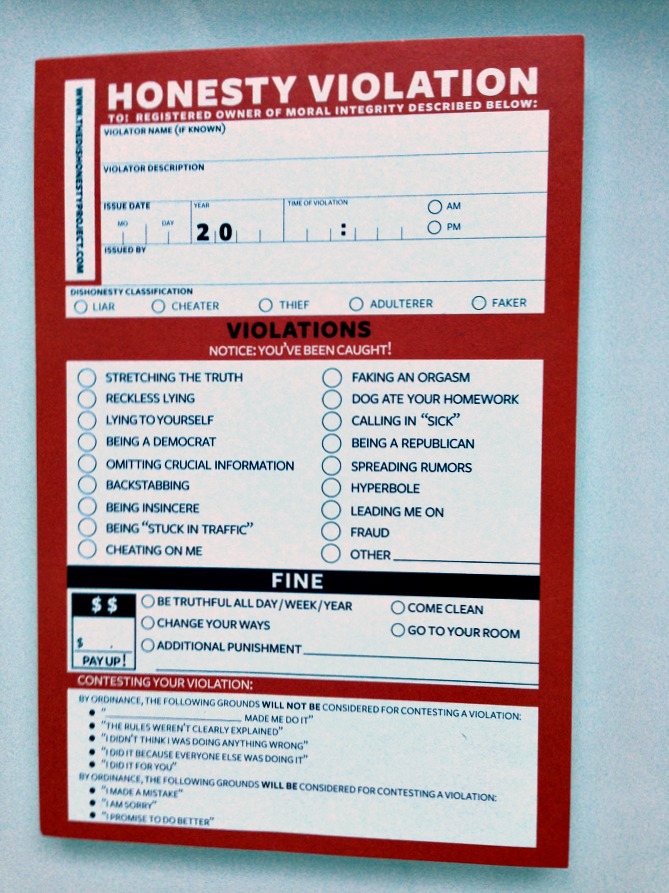The (Dis)Honesty Project & Dan Ariely
In the front lobby of the new West Union building at Duke University is this intriguing structure, the Truth Box (pictured above). It’s a part of the (Dis)Honesty Project.
To the right of the box is a table, above which you see a silhouette of a red Pinocchio. On the table there’s a bin with red-bordered Honesty Violation cards. You can take one out, fill it in and submit it. The cards look like this:

The project is by Dan Ariely, professor of Behavioral Economics at Duke and author, most recently, of The Truth About Dishonesty (2013).

Dan Ariely
Ariely investigates why we are dishonest, under what conditions we are dishonest, and how we rationalize what we’re doing in order to maintain a positive image of ourselves.
Yael Melamede directed the video (Dis)Honesty: The Truth About Lies featuring Ariely’s work.

Melamede is on the left. This image is from the 2015 New York City Film Festival.
The documentary is worth watching to hear people tell amazingly honest stories about how their dishonesty affected their lives.
The four main examples are:
(Dis)Honesty Project One: Insider Trading
Matthew Kluger, Garrett Bauer and Ken Robinson engaged in insider trading for a whopping seventeen years. They were eventually caught and convicted of securities fraud, money laundering and obstruction of justice. They started down their path because they thought they were not hurting anyone.

Kluger got 12 years behind bars, Bauer 9 and Robinson 2 ¼
Ariely has an experiment where he has groups solve 20 simple math problems in a restricted period of time, and they receive a dollar for every one they solve. He gives them an opportunity to cheat, and he gives himself a way to detect it. He’s tested 40,000 people. Only 20 big cheaters have emerged who’ve said they solved all 20 problems, but there have been 27,000 little cheaters who’ve said they solved 6 problems when they only solved 4. He estimates the economic impact of small cheating is high – when it comes to taxes, for instance, a loss in the range of $200 billion.
(Dis)Honesty Project Two: Extramarital Affairs
Cheating is calibrated to social norms. If everyone’s doing it, then there’s no big deal. The key is you have to perceive the cheater to be like you.
Erica Nelson, mother of six, says she wasn’t getting the emotional support from her husband she needed and so she sought solace at the notorious website Ashley Madison, where everybody is married and looking for adventures. I just looked it up: the site’s tagline is 45 Million People Can’t Be Wrong!

Nelson’s husband eventually found out, and she is very sorry to have hurt a good man and her marriage.
(Dis)Honesty Three: NBA Referee Scandal
Former NBA referee Tim Donaghy tells his story of getting caught up in the pressure of coaches and the league’s higher-ups letting refs know to give the benefit of the doubt of traveling calls or fouls on market players like Kobe Bryant. The audience comes to see those players on the floor, not on the bench.
Somewhere along the way a friend asked him to pick games to bet on. His tips were consistently good, and his next step was to bet on games he himself was officiating.

He acknowledged, “I brought shame on myself, my family, and the profession.”
“When we are faced with conflicts of interest”, Ariely says, “we always know what the right side of the line is”. Donaghy did, too, but he crossed it and ended up spending fifteen months in prison.
(Dis)Honesty Project Four: Lying
The first time you lie, your brain registers a big negative response. By the tenth time you lie, the response has gone down. The brain adapts. Once you become a habitual liar, you’re not going to feel bad about it. You’ll feel normal.
Lying becomes even easier with distance from the crime. If you’re a golfer and you have a ball with a bad lie, you will not bend down, pluck the ball from the rough and place it on the fairway. However you just may give it a little kick, most likely while distancing yourself from the crime by looking up at the sky.
Here accountant Walt Pavlo tells his story about cooking the books at MCI. It started when a colleague showed him how to hide bad debts to make his performance look better. It was as easy as a few clicks on the spreadsheet, and then came the scheme to defraud the company of six million of dollars.

Walt Pavlo spent three years and five months in prison
There’s good news. When we’re reminded about honesty, we behave more honestly, because we all do want to have a good image of ourselves. On college campuses, for instance, Ariely has found that honor codes work.
Here’s the documentary:
See also: PolitiFact: Journalism Holding Power Accountable
Categorised in: Thoughts
This post was written by Julie Tetel Andresen




1 Comment